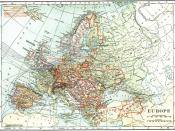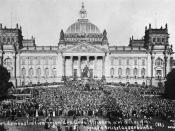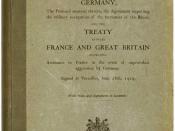The Treaty of Versailles was the treaty formed at the end of World War I, which many historians say caused the next major war, WWII. The Versailles Treaty did little to shape any sort of long-term peace from the results of World War I. Instead, the treaty, hastily put together, was vague, exposed the Allies' inability to cooperate toward an agreement, and fueled German nationalism from resentment over her treatment by the Allies in the treaty. The principle reasons for the failure of the Treaty of Versailles to establish a long-term peace include the following: 1) the Allies disagreed on how best to treat Germany; 2) Germany refused to accept the terms of reparations; and 3) Germany's refusal to accept the "war-guilt" clause, Article 231, led to growing German resentment and nationalism.
The Germans opposed the treaty of Versailles because the agreement was unfair to them. The terms of the treaty were harsh and the Germans suffered deep humiliation.
Since the Germans had not been involved in negotiating the treaty, a feeling developed in Germany that they were under no moral obligation to obey its terms. They called it a 'diktat' (dictated peace) because it had been imposed on Germany. The German government had signed the treaty but had not agreed to it. The Germans had no say in drawing up the treaty so they could feel free to ignore its terms.
While public opinions of nations were strongly in favor of seeing Germany pay to the fullest extent, only France aimed to not only seek revenge, but also to weaken Germany so that it would never be able to attack France again. France saw Germany as a potential threat to the future security of European stability. Britain saw Germany as a "barrier-fortress against the Russians" and an economically...


